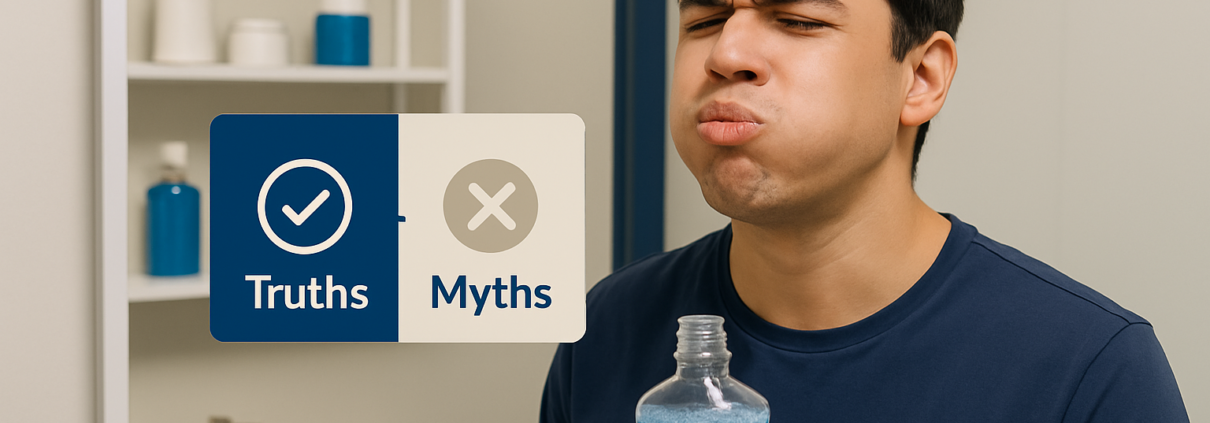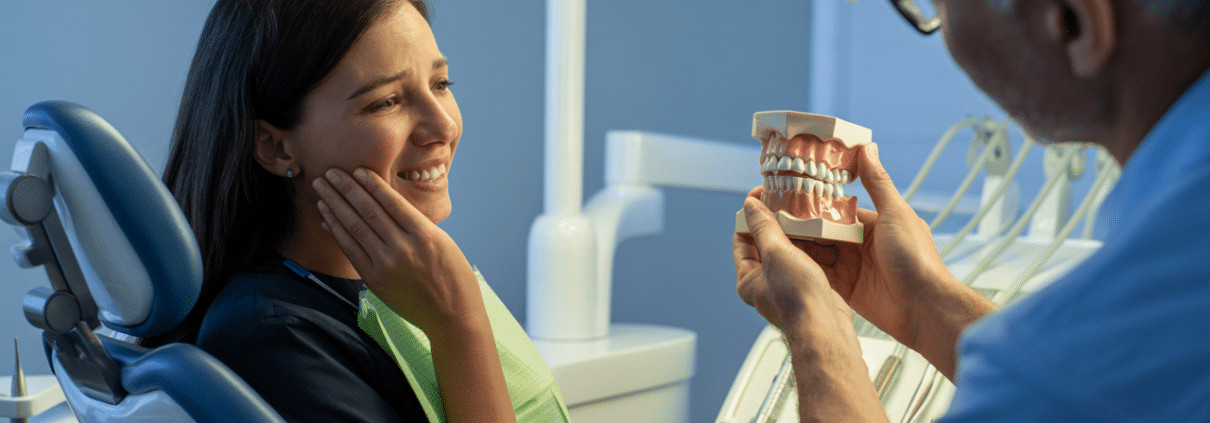Pregnancy changes just about everything—your hormones, your sleep schedule, even your snack cravings. But what many people don’t realize is that it can also take a serious toll on your mouth. From swollen gums to increased risk of cavities, pregnancy has a profound impact on your oral health—and your oral health can, in turn, affect your pregnancy.
This isn’t just about bleeding gums or a sore jaw. Studies have linked poor oral health to pregnancy complications like premature birth and low birth weight. That’s why expecting mothers should make oral care a priority—not just for themselves, but for their baby’s health, too.
TLDR – Quick Guide
- Pregnancy and Oral Health: Hormones can lead to gum inflammation, tooth decay, and more.
- Key Risks: Pregnancy gingivitis, enamel erosion, cavities, and pregnancy tumors.
- Why It Matters: Poor oral health has been linked to premature birth and other complications.
- Dental Care is Safe: Routine checkups and cleanings are recommended during pregnancy.
- Big Picture: A healthy mouth supports a healthy pregnancy—and a healthy baby.
Detailed Breakdown
What Happens to Your Mouth During Pregnancy?
Your body isn’t the only thing going through changes. Here’s what can shift in your mouth while pregnant:
- Increased Hormones: Estrogen and progesterone levels skyrocket, causing gums to become more sensitive and inflamed.
- Pregnancy Gingivitis: Up to 70% of pregnant women experience gum redness, swelling, and bleeding.
- Higher Risk of Cavities: Cravings for carbs and sweets, plus frequent snacking, can feed cavity-causing bacteria.
- Enamel Erosion: Morning sickness and frequent vomiting introduce stomach acid into the mouth, which weakens enamel.
- Pregnancy Tumors: These are non-cancerous growths on the gums that can appear during the second trimester.
These symptoms might seem like no big deal, but ignoring them can lead to more serious issues like periodontitis (advanced gum disease).
How Oral Health Impacts Pregnancy
It’s a two-way street. Just as pregnancy affects your mouth, your oral health can influence your pregnancy outcome.
- Periodontal Disease and Preterm Birth: Several studies suggest a link between untreated gum disease and increased risk of premature birth or low birth weight.
- Bacteria and Inflammation: Gum infections can release inflammatory markers and bacteria into the bloodstream, potentially affecting the placenta.
- Tooth Decay Transmission: Cavity-causing bacteria can be passed from mother to baby, especially after birth through shared utensils or kisses.
A study published in the Journal of the American Dental Association found that pregnant women with gum disease are up to 7 times more likely to deliver prematurely than women with healthy gums.
Is Dental Care Safe During Pregnancy?
Absolutely. In fact, routine dental visits are recommended during pregnancy, especially during the second trimester. Here’s the breakdown:
- First Trimester: It’s safe to get checkups and cleanings. Inform your dentist about your pregnancy.
- Second Trimester: This is the best time for dental work (cleanings, fillings, etc.) as the risk is lowest.
- Third Trimester: Treatment is still safe, but lying on your back for long periods may be uncomfortable.
Dentists will avoid X-rays and certain medications during pregnancy unless absolutely necessary—but don’t skip the visit.
How to Protect Your Oral Health While Pregnant
- Brush Twice a Day: Use fluoride toothpaste and don’t slack, even if you’re exhausted.
- Floss Daily: Keeps gums healthy and prevents gingivitis.
- Rinse After Vomiting: Use a mixture of water and baking soda to neutralize acid.
- Snack Smarter: Limit sugar and opt for teeth-friendly options like cheese, apples, and yogurt.
- Visit Your Dentist: Get a checkup and professional cleaning during your second trimester.
- Manage Morning Sickness: Ask your OB about safe ways to minimize acid reflux and vomiting.
If your gums bleed, don’t panic—but don’t ignore it either. Bleeding gums are common during pregnancy but need monitoring to prevent complications.
Key Takeaways
- Pregnancy affects your oral health due to hormone fluctuations and lifestyle changes.
- Common issues include gum inflammation, cavities, enamel erosion, and pregnancy tumors.
- Poor oral health can negatively impact pregnancy outcomes, including preterm birth.
- Dental care during pregnancy is safe and essential—don’t skip the checkups.
- Taking care of your teeth supports both your health and your baby’s well-being.
FAQs
Can I get dental X-rays while pregnant?
Generally, X-rays are postponed unless absolutely necessary. If required, your dentist will use a lead apron and minimize exposure.
Why do my gums bleed more during pregnancy?
Hormonal changes increase blood flow to gum tissues, making them more sensitive and prone to bleeding.
What if I need a dental procedure while pregnant?
Routine procedures like fillings and cleanings are safe. Urgent treatments should not be delayed.
How can I protect my teeth from morning sickness?
Rinse with a baking soda and water solution after vomiting to neutralize acid before brushing.
Is fluoride safe during pregnancy?
Yes. Fluoride toothpaste and professional treatments are safe and help prevent tooth decay.
A quick swish and you’re done—mouthwash gives you that minty-fresh feeling in seconds. But if you think that’s all it takes for great oral health, it’s time to rethink your routine. Mouthwash is a helpful tool, not a miracle cure. It’s also one of the most misunderstood products in the oral care aisle.
From believing it replaces brushing to thinking it can kill all bacteria, there’s a lot of misinformation swirling around the bottle. In this blog, we’re busting the most common mouthwash myths and clarifying what this rinse really brings to your dental game.
TLDR – Quick Guide
- Myth 1: Mouthwash replaces brushing—false.
- Myth 2: All mouthwashes do the same thing—nope.
- Myth 3: Alcohol-based rinses are better—not always.
- Myth 4: Mouthwash cures bad breath—only temporarily.
- The Truth: Mouthwash can support oral health, but it’s not a substitute for brushing, flossing, or regular dental visits.
Detailed Breakdown
Myth #1: Mouthwash Replaces Brushing and Flossing
Wrong. Mouthwash is not a shortcut for brushing and flossing. It doesn’t physically remove plaque or food particles like a toothbrush and floss do.
Fact: Mouthwash is a supporting player, not the star. It helps reduce bacteria and freshen breath but should be used afterbrushing and flossing, not instead of them.
Myth #2: All Mouthwashes Are the Same
Walk into any drugstore and you’ll see a wall of options. Antibacterial, fluoride, natural, alcohol-free… not all mouthwashes are created equal.
- Antibacterial rinses (like those with chlorhexidine or cetylpyridinium chloride) target plaque-causing bacteria.
- Fluoride rinses help strengthen enamel and prevent cavities.
- Cosmetic rinses focus mainly on breath freshening with little therapeutic value.
Fact: Choose a mouthwash based on your specific needs—gum health, cavity prevention, or breath control—not just the flavor.
Myth #3: Alcohol-Based Mouthwash Is More Effective
People often think the burning sensation from alcohol-based mouthwash means it’s “working.” But more burn doesn’t mean better results.
Fact: Alcohol is used as a preservative and antiseptic, but it can also dry out your mouth, making bad breath worse in the long run. Alcohol-free options are often just as effective and gentler on your tissues.
Myth #4: Mouthwash Cures Bad Breath
If you’re swishing to kill morning breath or cover up garlic from lunch, mouthwash can help temporarily. But if bad breath is constant, it might be a deeper issue.
Fact: Chronic bad breath, or halitosis, can be caused by gum disease, cavities, dry mouth, or even digestive issues. Mouthwash may mask the odor but won’t solve the root problem.
Myth #5: You Can’t Overuse Mouthwash
Yes, you can. Overusing strong, antibacterial mouthwash (especially those with alcohol) can disrupt your oral microbiome, drying out tissues and even irritating your cheeks and tongue.
Fact: Most dentists recommend using mouthwash once or twice a day—no more unless advised by your dentist.
When Mouthwash Helps (and When It Doesn’t)
Mouthwash Can Help With:
- Reducing plaque-causing bacteria
- Fighting early-stage gum disease (gingivitis)
- Freshening breath
- Delivering fluoride to strengthen enamel
- Post-surgical care (with prescription rinses)
Mouthwash Can’t:
- Replace brushing and flossing
- Cure gum disease
- Remove tartar or plaque
- Permanently eliminate bad breath
- Prevent cavities without other hygiene practices
Key Takeaways
- Mouthwash is a useful tool, not a total solution.
- It can reduce bacteria, deliver fluoride, and freshen breath—but it doesn’t clean your teeth.
- Not all mouthwashes are the same—choose based on your oral health needs.
- Alcohol-based formulas aren’t always better and may worsen dry mouth.
- Daily brushing, flossing, and dental visits still do the heavy lifting.
FAQs
Should I rinse with water after using mouthwash?
It depends. If you’re using fluoride mouthwash, don’t rinse—it washes away the fluoride. Check the label or ask your dentist.
Can kids use mouthwash?
Yes, but usually starting at age 6 and only under adult supervision. Choose alcohol-free versions made for children.
Is it better to use mouthwash before or after brushing?
Most dentists recommend using it after brushing and flossing to rinse away loosened debris and deliver active ingredients.
Can mouthwash prevent cavities?
Fluoride-containing mouthwash can help prevent cavities, but it won’t work alone—daily brushing and flossing are still essential.
Does mouthwash kill all the bacteria in your mouth?
No, and that’s a good thing. Your mouth needs healthy bacteria. Overusing strong antibacterial rinses can throw off this balance.
Ever yawned or chewed and felt a pop in your jaw? Maybe it’s more of a click, or worse—chronic pain that radiates to your temples or neck. These aren’t random quirks; they could be signs of a TMJ disorder, a condition affecting millions that often flies under the radar.
TMJ (temporomandibular joint) disorders are more than just annoying sounds or jaw fatigue. Left unchecked, they can cause persistent pain, headaches, lockjaw, and even impact your ability to eat and speak comfortably. The good news? Dentists are uniquely equipped to diagnose and treat TMJ disorders, often with non-invasive methods that bring fast relief.
TLDR – Quick Guide
- TMJ Disorders: Affect the joint connecting your jawbone to your skull.
- Common Symptoms: Popping, clicking, pain while chewing, headaches, and jaw locking.
- Major Causes: Stress, teeth grinding, arthritis, jaw injuries, or misalignment.
- Treatment Options: Night guards, bite adjustments, physical therapy, or dental splints.
- Bottom Line: Early treatment leads to better outcomes—and less pain.
Detailed Breakdown
What is the TMJ, and What Can Go Wrong?
The temporomandibular joint acts like a sliding hinge that connects your lower jaw (mandible) to your skull. You use it constantly—for talking, chewing, yawning, and swallowing. When something goes wrong with this joint or the surrounding muscles, it’s called a TMJ disorder (TMD).
The National Institute of Dental and Craniofacial Research estimates that over 10 million Americans are affected by TMDs, yet many cases go undiagnosed or misdiagnosed.
Symptoms of TMJ Disorders
TMJ disorders can show up in subtle or severe ways. Common symptoms include:
- Clicking, popping, or grinding sounds when you move your jaw
- Jaw pain or soreness, especially in the morning
- Headaches or migraines
- Pain in the ear or around the temples
- Difficulty chewing or a tired feeling in the face
- Locking of the jaw (either open or closed)
- Pain or swelling on one or both sides of the face
It’s not always just the joint that’s affected—TMJ disorders can mimic other conditions like ear infections or tension headaches.
What Causes TMJ Disorders?
TMJ disorders have multiple potential triggers, including:
- Bruxism (Teeth Grinding or Clenching): Often unconscious, especially during sleep, this puts excessive pressure on the jaw joint.
- Arthritis: Both osteoarthritis and rheumatoid arthritis can damage the cartilage and bones in the TMJ.
- Injury or Trauma: A hit to the jaw or face can misalign the joint.
- Misaligned Bite: When your teeth don’t come together properly, the jaw has to compensate.
- Stress and Muscle Tension: Chronic jaw clenching due to stress is a major contributor.
Many patients have a combination of these factors, which is why personalized care is critical.
How Dentists Diagnose TMJ Disorders
Your dentist may:
- Ask About Your Symptoms: Including duration, triggers, and severity.
- Palpate the Joint and Muscles: To check for tenderness or abnormal movement.
- Listen for Sounds: Like popping or grinding while you open and close your mouth.
- Take Dental X-Rays or CT Scans: To assess bone structure and joint position.
- Evaluate Your Bite: Misalignment can often be the root cause.
Because there’s no single “TMJ test,” diagnosis relies on a combination of observation, imaging, and symptom tracking.
Effective Treatment Options
TMJ treatment varies depending on severity and cause. Fortunately, many patients find relief with non-invasive interventions:
- Custom Night Guards or Splints: Worn at night to reduce clenching and align the jaw.
- Physical Therapy: Exercises to strengthen and stretch jaw muscles.
- Bite Adjustments or Orthodontics: Correcting misaligned teeth or uneven bites.
- Stress Reduction Techniques: Meditation, counseling, or jaw relaxation exercises.
- Medications: Anti-inflammatories, muscle relaxants, or topical analgesics.
- Injections: In some cases, Botox is used to relieve overactive jaw muscles.
Surgery is rare and only recommended if all other treatments fail and the joint structure is severely damaged.
Key Takeaways
- TMJ disorders cause jaw pain, popping, and tension that can affect daily life.
- They’re commonly triggered by stress, bruxism, injuries, or bite misalignment.
- Dentists are trained to diagnose TMJ issues and offer personalized, non-invasive treatments.
- Early intervention reduces the risk of chronic pain or permanent joint damage.
- Ignoring jaw clicking might mean missing a critical health clue.
FAQs
Is jaw popping always a sign of a TMJ disorder?
Not necessarily. Occasional, painless popping may be harmless—but if it’s frequent or painful, it should be evaluated.
Can TMJ disorders go away on their own?
Mild cases sometimes improve with lifestyle changes, but chronic or painful TMJ should be treated by a dentist.
Will I need surgery for TMJ?
Surgery is rarely needed. Most people find relief with splints, bite therapy, and stress management.
How long does TMJ treatment take?
It depends on the cause and severity. Some patients improve within weeks; others need ongoing care.
Can I prevent TMJ disorders?
Managing stress, avoiding jaw overuse (like chewing gum), and treating teeth grinding early can help prevent issues.



